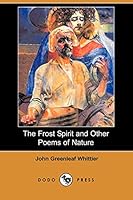Description
John Greenleaf Whittier (1807-1892) was an influential American Quaker poet and ardent advocate of the abolition of slavery in the United States. Although he received little formal education, he was an avid reader who studied his father's six books on Quakerism until their teachings became the foundation of his ideology. He was heavily influenced by the doctrines of his religion, particularly its stress on humanitarianism, compassion, and social responsibility. First introduced to poetry by a teacher, Whittier published his first poem in 1826 in William Lloyd Garrison's Newburyport Free Press. In June of 1833, he published the antislavery pamphlet Justice and Expediency, and from there dedicated the next twenty years of his life to the abolitionist cause. He was editor of The National Era; one of the most influential abolitionist newspapers in the North. For the next ten years it featured the best of his writing, both as prose and poetry. His works include: At Sundown (1890), Anti-Slavery Poems, My Summer With Dr. Singletary, Criticism, Historical Papers, Margaret Smith's Journal and The Bridal of Pennacook .



 Amazon UK
Amazon UK